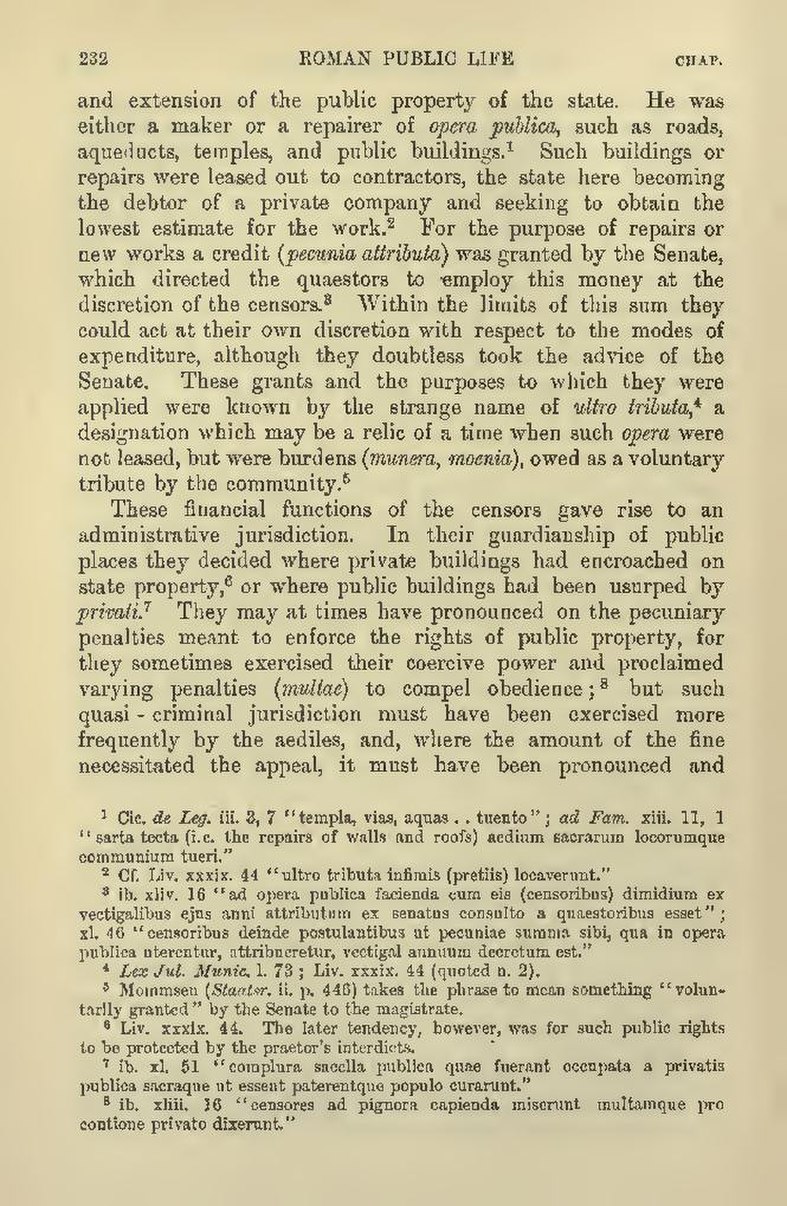and extension of the public property of the state. He was either a maker or a repairer of opera publica, such as roads, aqueducts, temples, and public buildings.[1] Such buildings or repairs were leased out to contractors, the state here becoming the debtor of a private company and seeking to obtain the lowest estimate for the work.[2] For the purpose of repairs or new works a credit (pecunia attributa) was granted by the Senate, which directed the quaestors to employ this money at the discretion of the censors.[3] Within the limits of this sum they could act at their own discretion with respect to the modes of expenditure, although they doubtless took the advice of the Senate. These grants and the purposes to which they were applied were known by the strange name of ultro tributa,[4] a designation which may be a relic of a time when such opera were not leased, but were burdens (munera, moenia), owed as a voluntary tribute by the community.[5]
These financial functions of the censors gave rise to an administrative jurisdiction. In their guardianship of public places they decided where private buildings had encroached on state property,[6] or where public buildings had been usurped by privati.[7] They may at times have pronounced on the pecuniary penalties meant to enforce the rights of public property, for they sometimes exercised their coercive power and proclaimed varying penalties (multae) to compel obedience;[8] but such quasi-criminal jurisdiction must have been exercised more frequently by the aediles, and, where the amount of the fine necessitated the appeal, it must have been pronounced and
- ↑ Cic. de Leg. iii. 3, 7 "templa, vias, aquas . . . tuento"; ad Fam. xiii. 11, 1 "sarta tecta (i.e. the repairs of walls and roofs) aedium sacrarum locorumque communium tueri."
- ↑ Cf. Liv. xxxix. 44 "ultro tributa infimis (pretiis) locaverunt."
- ↑ ib. xliv. 16 "ad opera publica facienda cum eis (censoribus) dimidium ex vectigalibus ejus anni attributum ex senatus consulto a quaestoribus esset"; xl. 46 "censoribus deinde postulantibus ut pecuniae summa sibi, qua in opera publica uterentur, attribueretur, vectigal annuum decretum est."
- ↑ Lex Jul. Munic. l. 73; Liv. xxxix. 44 (quoted n. 2).
- ↑ Mommsen (Staatsr. ii. p. 446) takes the phrase to mean something "voluntarily granted" by the Senate to the magistrate.
- ↑ Liv. xxxix. 44. The later tendency, however, was for such public rights to be protected by the praetor's interdicts.
- ↑ ib. xl. 51 "complura sacella publica quae fuerant occupata a privatis publica sacraque ut essent paterentque populo curarunt."
- ↑ ib. xliii. 16 "censores ad pignora capienda miserunt multamque pro contione privato dixerunt."
